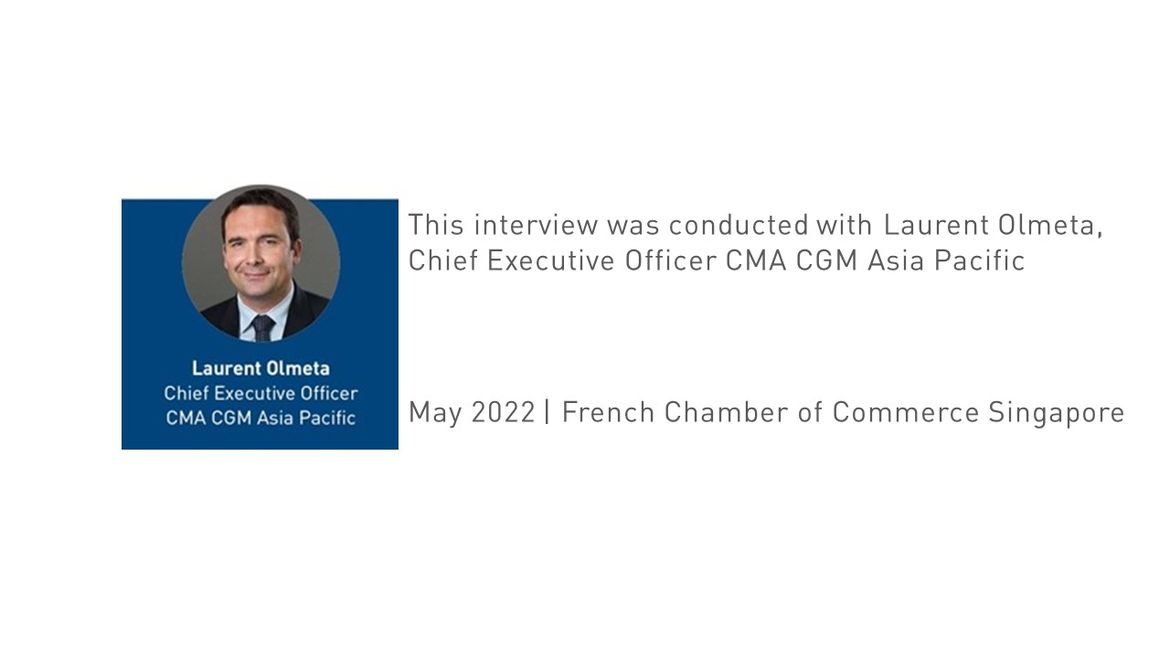Companies news • Analyses & Studies • Portraits • Publications
CEO Sustainability Series | Laurent Olmeta Chief Executive Officer CMA CGM Asia Pacific

As part of the Sustainable Business initiative, the French Chamber of Commerce in Singapore presents a leadership interview series where we invite CEOs and key executives to discuss crucial management qualities that drive successful sustainable transformation.
Question 1: How is CMA CGM paving the way for a more sustainable shipping and logistics industry in its race towards net zero carbon by 2050?
The CMA CGM Group is moving forward on its path to become a Net Zero Carbon Company by 2050, and we are leading shipping’s energy transition. A world leader in shipping and logistics, CMA CGM has chosen in 2017 to invest in dual-fuel gas powered vessels that run on liquefied natural gas (LNG), avoiding up to 99 per cent of atmospheric pollutant emissions.
LNG is an important first step in reducing greenhouse gas emissions, and the engines installed on these vessels are already capable of using BioLNG, reducing 67 per cent of CO2 emissions on a well-to-wake basis. In the coming years, those engines will run on synthetic methane (including e-methane). The Group already has a fleet of 28 “e-methane ready” vessels in service and will have a total of 44 such vessels by the end of 2024.
Today, the Group is also using biofuel onboard its container ships that serve Intra-Europe. Biofuel, together with alternative fuels such as LNG and biomethane among others, will make up 10 per cent of the Group’s energy mix by 2023. As the Group continues to decarbonize shipping through research and development, it is also advancing through stakeholder collaboration.
Through strategic partnerships, the Group is championing industrial-scale production and distribution of Bio-LNG (produced from agricultural and industrial food waste); and synthetic methane (derived through gasification of industrial, wood and plastic wastes).
The Group is also actively exploring emerging technologies that could help us achieve our objective towards net zero carbon by 2050. We are committed to developing transport and logistics solutions that are more respectful of the planet, and is acting now to protect the climate, as well as the environment and biodiversity. In June, our Group’s chairman and CEO Rodolphe Saadé announced CMA CGM’s decision to stop carrying plastic waste on board any of
its ships worldwide.
Question 2: How does CMA CGM involve its stakeholders in its sustainability strategy in the long term?
The CMA CGM Group’s Sustainability strategy is based on a collaborative approach. We believe that positive change is only possible if all players in the ecosystem are on board a shared journey.
The Group collaborates with like-minded stakeholder groups across industries including NGOs like the WWF and startups through Zebox, the startup incubator and accelerator founded in 2018 by Rodolphe Saadé. This also includes members of the Coalition for the Energy of the Future. Initiated by Rodolphe Saadé, the Coalition seeks to accelerate energy transition in transport and logistics. In February, the CMA CGM Group collaborated with the Maritime and Port Authority of Singapore (MPA) to start biofuel bunkering in Singapore as part of its global trial to scale-up the wider adoption of the clean energy. CMA CGM also participated in the Maritime Singapore Connect (MSC) Maritime Case Summit, in which tertiary students tackled case challenges at the intersection of business and sustainability.
The Group has also been successful in onboarding customers on the decarbonization journey through ACT with CMA CGM+, a range of high value-added services that enable our customers to analyse, reduce and offset the environmental footprint of the shipment of their goods.
Internally, we implement company-wide strategies and programs to engage and educate our employees to Act for People, Planet and Fair Trade in Better Ways. CMA CGM has thus launched MY DAILY IMPACT, a platform to engage staff members to take concrete action to protect the environment. The program allows for a better understanding of climate issues, customized
tools to assess everyone’s carbon footprint, as well as individual and group challenges to limit staff members’ environmental in their day-to-day activities.



